#all most recent iterations of peter Parker examined
Text
My super factual—unarguable— opinions about what Peter is the most “Peter” Peter.
Now to list my accomplishments the make me the best judge of this contest : because I said so.
(Seriously this is all my own opinion about the most recent or most well known variations of “Peter Parker”. I’m not judging on how close they are to emulating the 1960’s version of peter but the like face or personality that just screams “I am a good boy — killing people is never ok — Guilt complex a mile wide — beating yourself up for mistakes — who needs therapy when you have quips???” Kinda stuff!)
Aight to the list! Top to bottom is “worst” to “best” since all peters are still so good in their own ways.

6# At the very bottom of my list is sadly the Peter Parker from “The Amazing Spiderman” comics from around 2014 — present. Two words. Tony Vibes. I don’t hate him and as “spider-man” he is quite literally perfect but when out of the mask Peter is just somehow arrogant?? Super confusing because he never says anything that I’m like “ugh” at its just how he’s portrayed by the artists i guess. He’s too confident and acts so much like Tony he basically is Tony. Also uh who hurt the artist who decided that they would draw him like THIS??? Not cute. AT ALL. I’m aware that he’s like 30 something in the run but he looks like Clark Kent not Peter. I really dislike him but its really evened out by how well Spider-Man is written. They’re almost like two completely different people which is SO annoying. He also weirdly “hits” on women (not in a disrespectful way)? Not inherently a bad thing but it just doesn’t feel right. It’s a no from me.
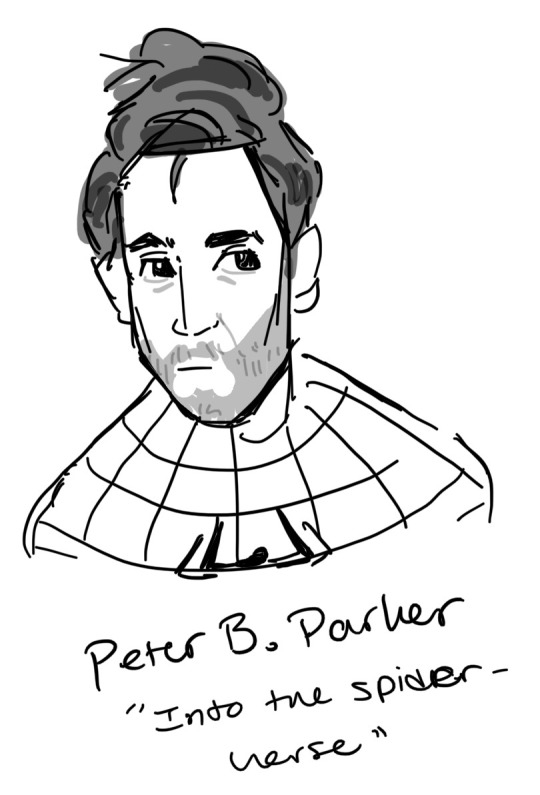
5# It pains me to put him 2nd from last Peter B. Parker is Peter to the MAX but old and super tired. My gripe is not with his personality but with his design! Too long! The head is too long. I don’t know why but when i think of Peter and Spider-Man the head shape is not even close to this. I actually really really love how his personality is in the movie — he’s just so sad its hard to watch but he’s SO Peter. Beating himself up about his break up with Mary Jane and just losing his will to go on anymore. He feels like he has nobody that really cares or needs him anymore so he’s lost most of the sweet and innocent “everyone deserves a second chance” for everyone but himself most of all. The scene with Mary Jane in the ballroom is AMAZING such a Peter thing to do — foot in mouth syndrome — he wants so badly to not fail another person he cares about he’s so awkward and earnest. Ughhhhh I love him his personality is one of my favorites but the design kills me.

4#…I’m sorry I know this is now getting a little mean but his head! It’s the wrong shapeeee. I’m aware I’m so shallow but there are other reasons why he’s lower on the list i promise. Didn’t really like how Peter skateboarded? Not sure why it just doesn’t suit the polite sweet science nerd who can barely get a word out without the stutter or an apology. There are so many things that I love about the way that Andrew portrays Peter’s personality. He gets the nervous PERFECT. He’s fidgety and so earnest it hurts. He cares so much its so good. Also of the live action spider-man he NAILS the kinda mean quips and jokes that Peter is known for. Constantly cracking jokes and being super annoying is exactly how peter is as spider-man so I really really love Andrew’s personality interpretation. It’s SO good i could talk forever he got totally screwed with the script but he killed it.
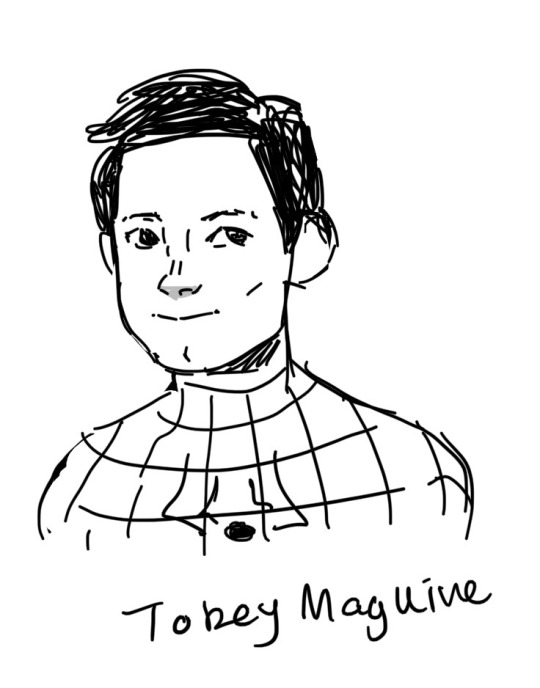
3# Now I am aware that my fondness for the Tobey spider-man has no limit. I love him so much and he really got me through a bad childhood buuuutt his spider-man? I hate to say it is SO BAD. No jokes?? He’s too straight laced both as peter and as spider-man so he never really feels like “Peter”. His face shape and sweet shy demeanor? AHGHHHHGH ITS SO FUCKING CUTE. He’s so awkward!! His face does all these movements that make me think “oh my god he’s so out of it he’s so nervous i love him he’s such a good guy”. He just makes me think this guy really is innocent enough to believe not only that he can win against any of his enemies but also that everyone deserves that second chance. This is so important to me for a Spider-Man and peter to have a belief that is so strong held nothing could ever shake his belief. Maybe someone could make peter doubt his ability but never his morals. That’s what makes him such a good Peter Parker.
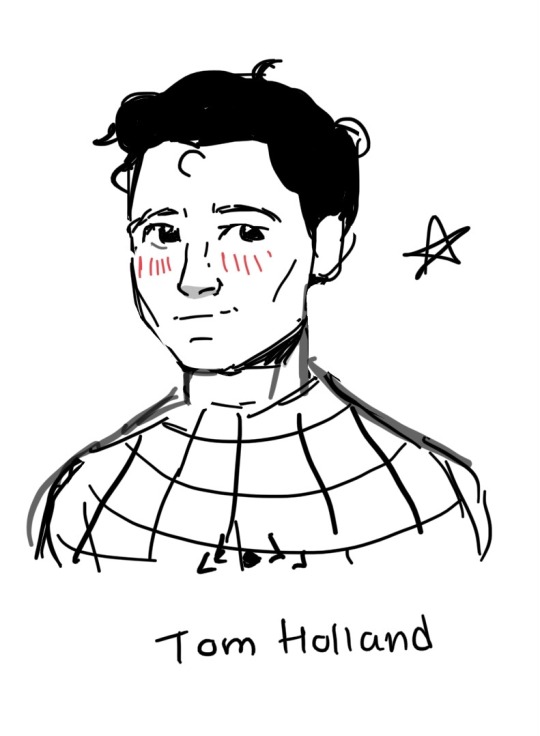
2# You wouldn’t have been able to hear me say this before “No Way Home” because i really disliked the MCU Peter AND Spider-Man interpretation. It was not good at all. Somehow he was too geeky but not nerdy enough??? Does that make sense? He never really felt guilty about ditching his friends and responsibilities to be Spider-Man which is so important???? Like why is he just “eh” when he hurts anyone emotionally and ditches things he wanted to do like the group he was in Homecoming. It really started to tick me off. Peter as a person shouldn’t be that way so Tom never felt right to me. Then the fucking sun that was no way home made Peter so MISERABLE and i finally got to see him be selfless. Being spider-man is probably the most thankless job in the entire world and Peter just accepted that and more. He didn’t just fix the mistakes he made that affected him but by sacrificing his own happiness both involuntarily and then voluntary at the end he fixed the mistakes of people he believed in. It. Was. Perfect. I was so shocked that it as so good that i had the same kind of “this can’t be real” feeling i got during Sherlock season 4 LMAO except No Way Home was the complete opposite of that shit show. When Peter moved into that shitty apartment at the end with his GED book i sobbed and thought that he’s got to be the best live action spider-man just for that one fucking moment. God. Incredible.
Now last but never fucking least is my favorite Spider-Man interpretation in the entire world…
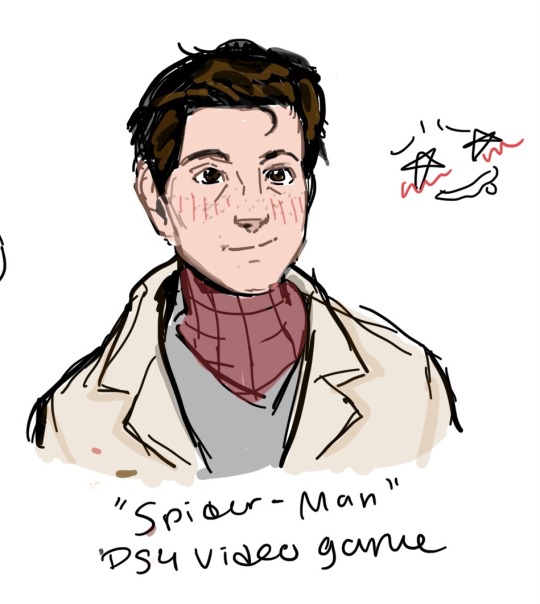
1# The PS5 video game!! I can not sing the praises of this game enough it just oozes love for Spider-Man and Peter Parker. His face? PERFECT SO FUCKING PERFECT I COULD AND DO CRY ABOUT IT. The expressions are incredible. Peter is definitely confident and nerdy and sweet and kind and he has that crazy moral compass that no body can beat. He just — screaming, crying, sobbing I can’t even mention all the things i love about this man right here he IS Peter Parker and Spider-Man which is so hard to write its insane. He is devastated when he can’t bear his real life responsibilities and be a super hero at the same time and that is just!!!!!! No words only noises. Also he is just so funny i laugh at his terrible jokes whenever i play the game because they land so well because they’re super annoying and so bad. The worst dad jokes you’ve ever heard. I love himmm.
#spiderman#Spider-Man#spidey#webs#tobey!peter parker#peter parker#all most recent iterations of peter Parker examined#no way home#no way home spoilers#marvel mcu#mcu spiderman#mcu spoilers#andrew!spiderman#tom holland#tom!spiderman#peter b parker#spiderman into the spiderverse#into the spider verse#comics#comic spoilers#comic spiderman#comic peter Parker#there was no reason for this to be this long but it is so
220 notes
·
View notes
Text
I saw someone recently accuse Peter of being immoral, of being selfish and ‘gaslighting’ of his friends and family in withholding his secret from them.
My kneejerk reaction to that is to defend the character, but I sat down and really tried to inquire about the question.
My conclusion is twofold:
It depends upon the context and
He wasn’t being very nice in deceiving them...but it was far from immoral or anything else for him to do so.
I really hate cynical hot takes on the character like that so let’s talk about it.
For a microcosm I’m going to be using Peter’s more iconic supporting cast members circa the Silver Age when he was at ESU, specifically up until issue #122.
Why?
Well to examine Peter in high school is rather redundant. However much slack you could arguably cut college era Peter for his youthfulness, you go further for High school Peter. Also he didn’t have many friends in the first place. Finally the college era simply contains the most iconic iterations of Peter’s supporting cast and social group.
I’m also not looking at every supporting cast member because who cares that he didn’t confide in Josh (do you even remember him) or Jameson (obvious).
Before I begin to look at any of these characters we should properly contextualize things.
Peter’s secret is no laughing matter.
It’s more than just his sense of privacy and anonymity being violated.
It’s more even than his ability to have a freer hand in fighting crime and thus work faster and more efficiently, saving more people.
If people find out who he is then between the law, Jameson, criminals and super villains, it’s open season for everyone Peter cares about or is too closely connected to him, not to mention Peter himself.
Peter’s experiences with Norman Osborn learning his secret in ASM #39 alone were a major example of what he risks, of how dangerous and violent, his life could become if even one bad person learnt his secret.
And the fact is the more people who know his secret, the more likely it is that it will become compromised. Even telling just one person, if they are the wrong person, could have devastating results.
Whomever Peter potentially trusts must be able to keep a secret, keep a secret under pressure, not give anything away, be able to deal with that massive burden day in and day out and above all else be loyal to him and stand a good chance of remaining loyal to him.
A great example of what it could mean to trust someone too hastily is provided in MIles Morales: Ultimate Spider-Man. The young Miles reveals his identity to his girlfriend Kate Bishop and in turn she reveals it to her parents who are in fact HYDRA agents.
Whilst this is an extreme example it nevertheless illustrates the extreme risk of trusting the wrong person with something like this.
We must keep this in mind going forward.
One final thing to keep in mind is the timeline. We’re bouncing around a bit here but we’re essentially looking at broadly Peter’s start of college to Gwen’s death (ASM #31-ASM #121). We don’t have a pinned down timeframe for that. But we do know Peter’s college years lasted about 4 years, which is standard. 2 of those years elapsed between Gwen’s death and the 1970s Clone Saga. We then got 30+ issues until Peter graduated.
Those 30+ issues combined with ASM #31-121 must therefore account for another 2 years and given how the latter is a larger span of issues than the former ASM #31-121 can logically be presumed to transpire across over a year.
For the purposes of this essay, we are presuming 18 months.
Let’s tackle these guys one by one.
Aunt May: Beyond a doubt from Peter’s point of view absolutely not could he reveal his secret to Aunt May.
Nowdays we might argue it was corny, possibly sexist, possibly just dumb and convenient writing to have May be so frail that learning his secret would kill her.
Nevertheless though, that was genuinely what he believed.
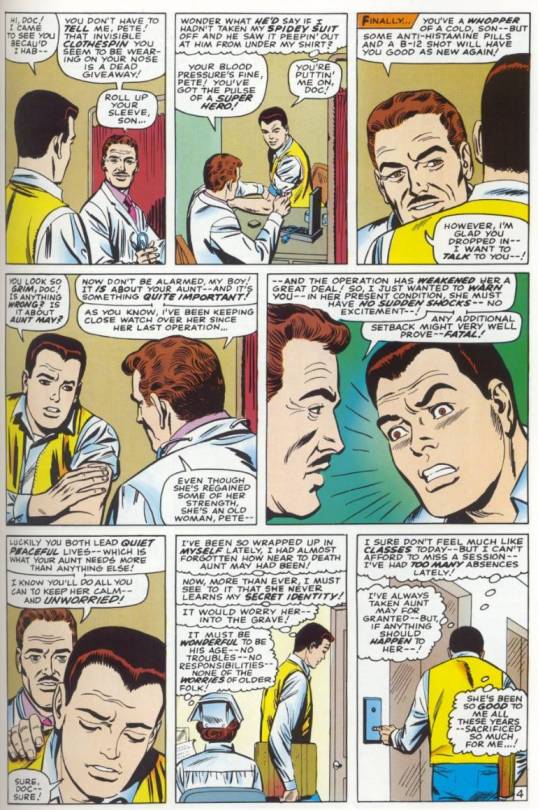
Now for sure Peter didn’t tell May his secret before this...but in fairness to him he was young, dumb and she did mention more than once how she didn’t approve or like Spider-Man. Coupled with his teenage concern that she’d hate him for his role in Ben’s death it’s entirely sympathetic that Peter would keep her in the dark, not to mention he knew how much she already worried about him.
Furthermore whilst the idea of a big shock being fatal to her wasn’t brought up before ASM #39, you could very easily argue that Peter in observing her age, trips to the hospital and frailty made a perfectly sound decision to not put her through any huge shocks or massive concerns for him.
Going forward Peter maintaining the secret can be viewed as a force of habit and to be frank even in Len Wein’s run May in the mid-late 1970s May was keeling over from too much stress and stimulation. Before that in ASM #144 she already went to the hospital upon laying eyes on a seemingly resurrected Gwen Stacy. Learning her nephew was Spider-Man? The idea that very well could’ve killed her was an entirely reasonable presumption for Peter to hold going forward.
Thus not telling her is not selfish on his part, it’s literally saving May’s life.
By extension it also adds fuel for him to maintain his secret in general. It isn’t even that villains could target Aunt May, it’s that merely finding out could kill her as far as Peter knows.
Flash Thompson: This one is also rather easy.
Peter and Flash were rivals in high school. They were rivals still in college but began to mellow. It took Gwen dying and Peter losing his home for the two to truly start to connect and that bad blood was still cropping up from time to time thereafter.
In the silver age though they were simply not nearly close enough for Peter to entrust something as dangerous as his secret to someone who’d shown so little trust and loyalty to him as Peter Parker. Flash may even in Peter’s mind resented learning his hero was the guy who had such a bad history with. It didn’t help that even though they mellowed somewhat in college Flash’s trips in the military meant he and Peter spent less time together TO get to know one another.
Mary Jane Watson: Of course with hindsight we know that MJ was aware of who Peter was and was totally trustworthy.
But Peter didn’t.
He was fooled by the scatterbrained party girl facade, the woman who seemed zany enough to be impressed by a big hole in a wall.
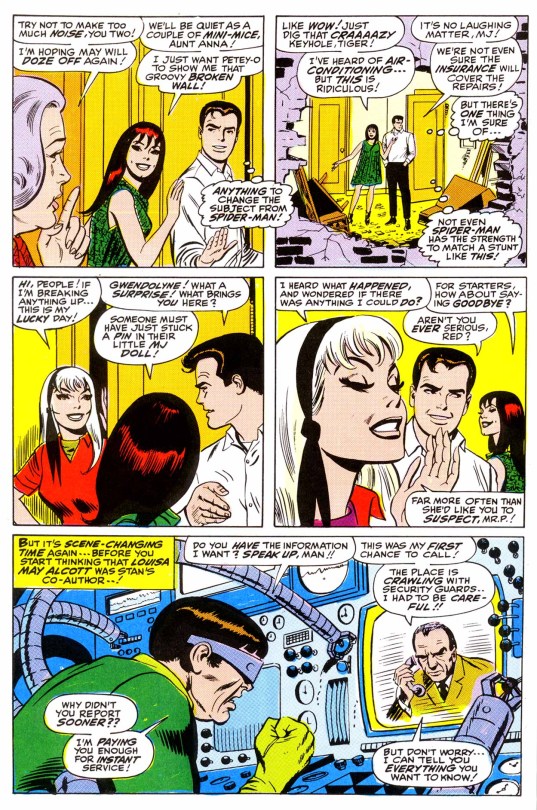
From his perspective MJ also didn’t seem all that loyal. As a friend they were not that close, merely going out a few times, bumping into one another at Anna or May’s, and hanging out as part of the larger group.
Yes MJ was seemingly interested in him due to her flirtations but from Peter’s POV at best this was her having some fun and at worst it was her just being like that with most people.
Also from Peter’s POV MJ crossed the line at times in her flirtations with him given her relationship with his friend Harry. If she was not particularly serious or loyal with him as a girlfriend there was little reason for her to trust her as a friend with a life or death secret.
If anything from Peter’s POV MJ was the most likely to spill the beans inadvertantly. It was a concern he held even up to the 1980s when she did reveal she knew the truth.
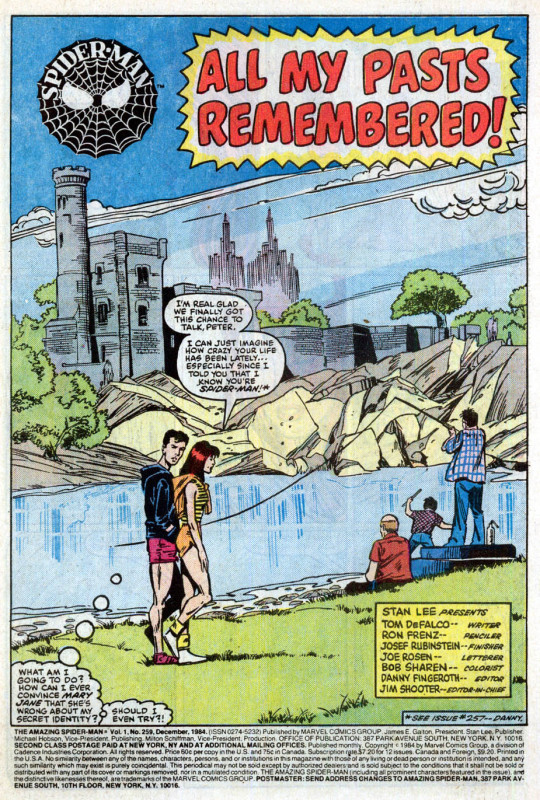
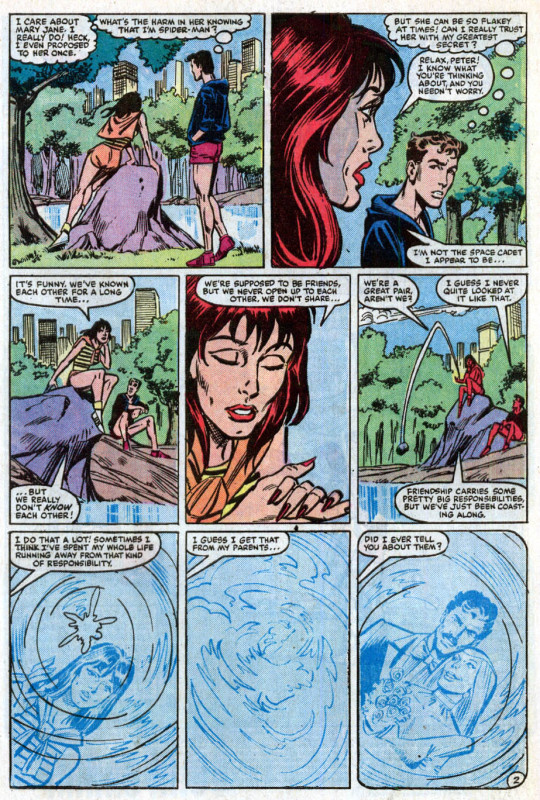
Harry Osborn: From a certain point of view, Harry seems like the best candidate for Peter to confide in.
He was Peter’s best friend and roommate after all.
The thing is...people do tend to exaggerate that. For sure they were friends, probably one another’s best friends even. But the term ‘best friends’ denotes images of staying up late to play video games, hitting the clubs, making a routine of catching movies together or regularly shooting the breeze.
This wasn’t the nature of Peter and Harry’s relationship. They hung out together of course, but their studies coupled with Peter’s relationship, work and Spidey troubles meant that they didn’t spend much on panel quality time together, at least not outside the main group.
It happened, but not as much as you’d think.
They cared about each other, but not to the extent the films and TV shows might play up.
In a sense Harry was Peter’s best friend almost by default. As in he was relatively speaking the person who outside of romance or family, was closest to him.
Harry though was also initially a bully towards Peter. He was initially jealous and resentful over Peter and Gwen’s relationship and at times showed similar frustrations regarding MJ’s attraction to Peter. And all that is before you talk about his major drug problem, how many pills would Harry take to cope with the burden of being Spider-Man’s BFF?
All these factors combined made Harry probably too unreliable a candidate for Peter to confide in.
But the single biggest problem...was his Dad.
Harry had major issues with his Dad and was damaged over losing his mother. Peter didn’t know just how deep those scars went but he could tell there were problems even early into their relationship.
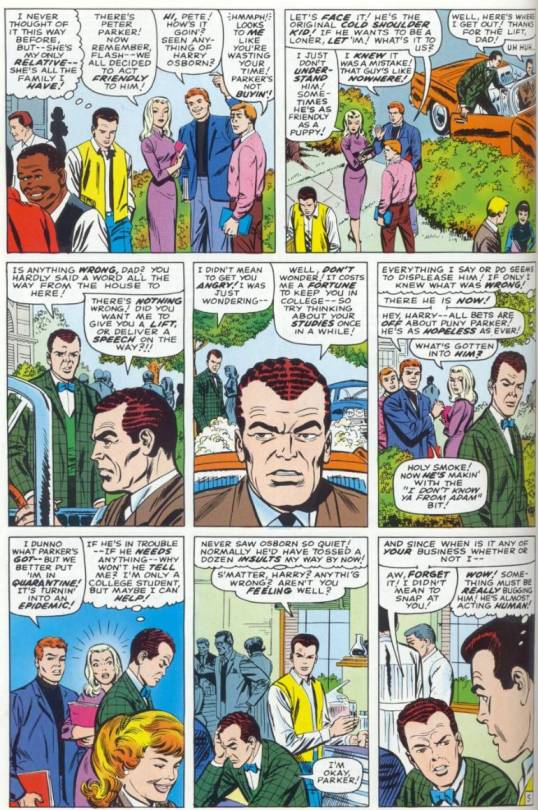
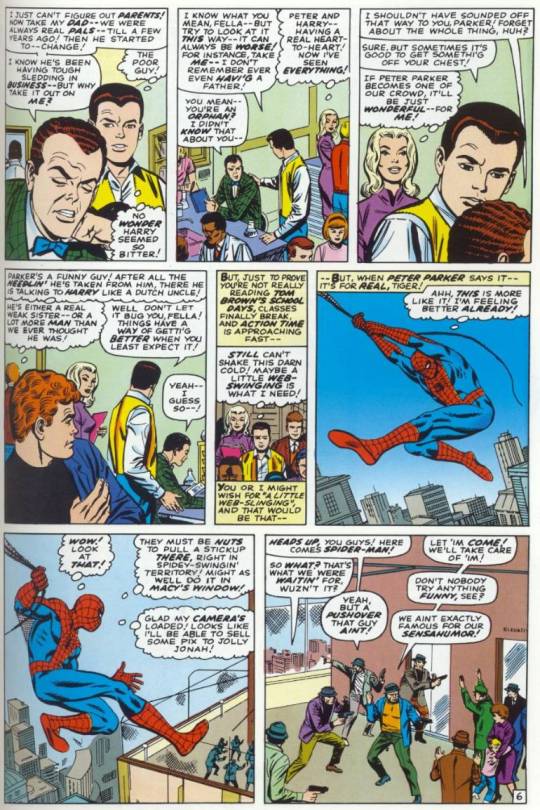
Now Harry’s issues alone should realistically have made Peter think twice about confiding in him.
But the fact that his Dad was also one of his villains, the one villain who’d know who he was if not for a case of inconsistent amnesia?
It was a non-starter.
If Peter told Harry, Harry (frequently vulnerable and ever keen to please his father) would be extremely likely to let something slip to Norman. Or worse simply confide in Norman.
If Norman rediscovered his identity it vastly increased the possibility of him regaining his memories of being the Green Goblin and then game over.
In fact given Norman’s sometimes ruthless businessman life (even before he go his powers) along with his connections to J. Jonah Jameson and another senior gentleman we will be discussing below, Norman learning the truth was a huge risk even if he didn’t remember he was the Goblin.
Not to mention to ask Harry to keep this a secret from his own father whom he valued so highly would’ve been a humongous ask of Peter’s. Harry may simply have refused to do it, more than likely believing his father could also be trusted.
Gwen Stacy: Perhaps the most obvious candidate was Peter’s girlfriend.
Gwen as a confidant was a non-starter early in their relationship when she was a bully. And the same goes for later on when she blames Spidey for her Dad’s death. She was so hung up on it from Peter’s POV convincing her otherwise wasn’t really an option (this was confirmed by Gwen’s clone’s reaction to learning his secret in Spec Annual #8); also Peter’s decision made particularly more sense in light of an issue discussed below.
But later on when they had grown closer and were making no secret of how much they loved one another?
Shouldn’t Peter have told her?
Shouldn’t he have been fair to her in letting her in on the big secret?
Well actually...he did....and she took it terribly!
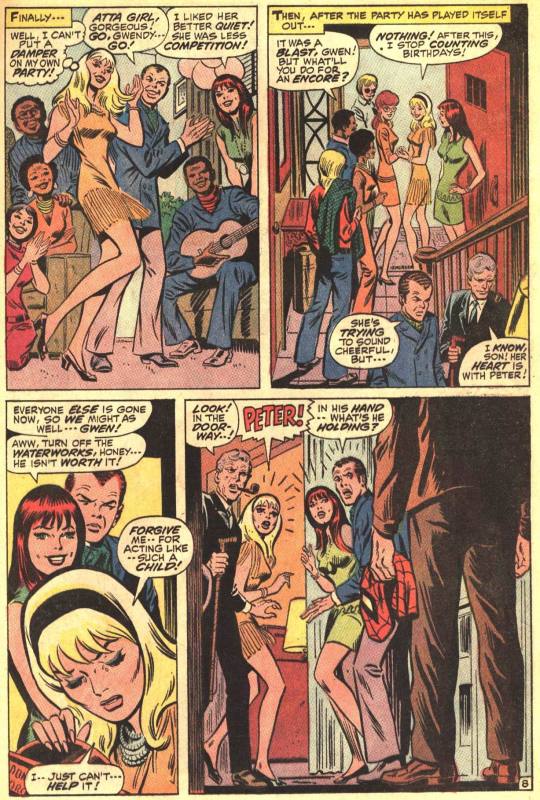
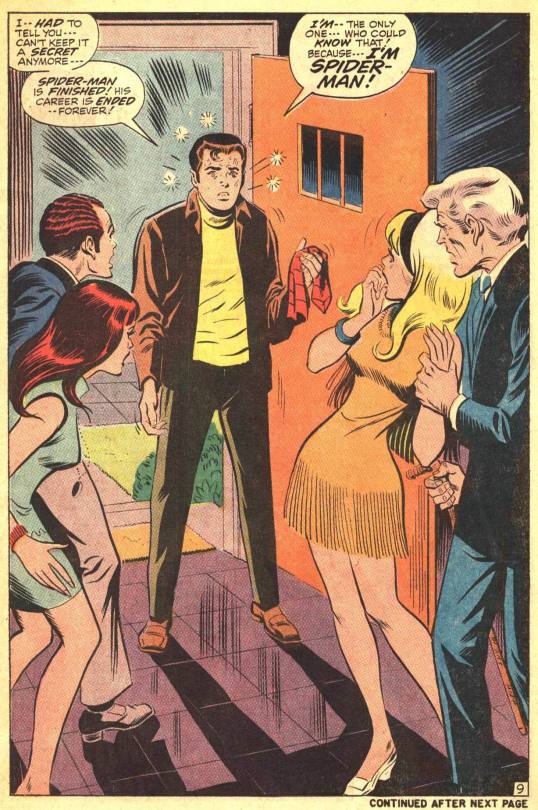
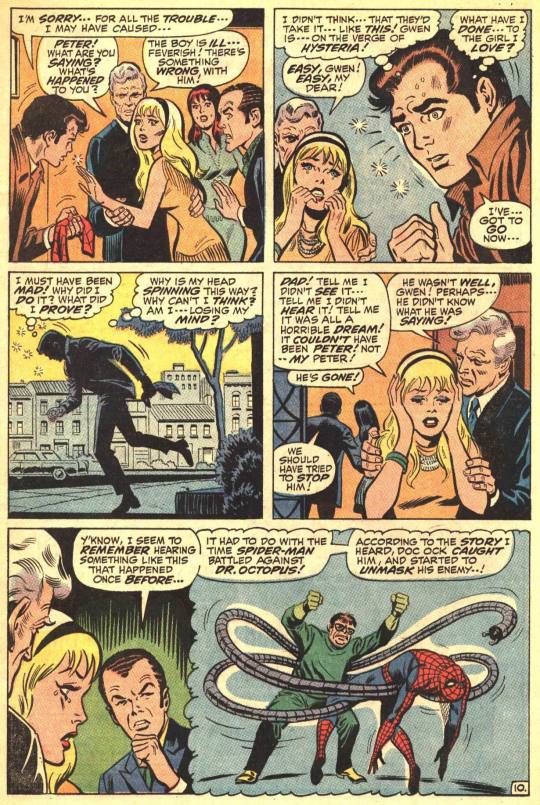
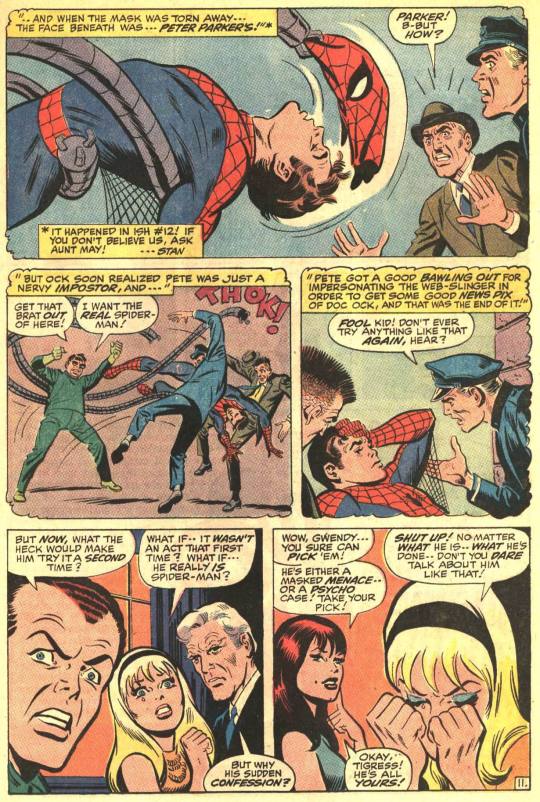
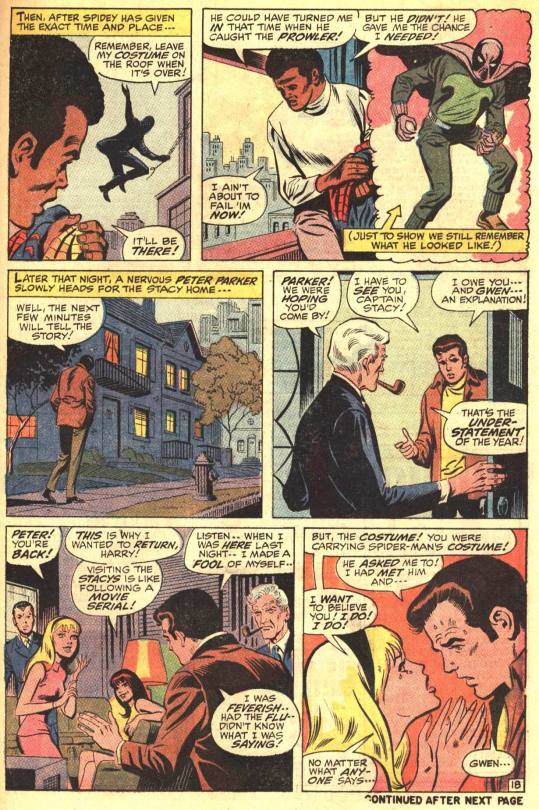
In ASM #87 a sickly and dazed Peter revealed his identity to Gwen, MJ, Harry and Captain Stacy.
Gwen broke down in tears, arguably becoming borderline hysterical. She didn’t want Peter’s news to be true.
Her dialogue and reaction pretty much indicate when confronted with the truth her instinct was to believe the worst of Peter.
To believe not that the stories of how horrible Spider-Man was were in fact lies because she knew Peter, but rather her loving boyfriend was in fact a pretense in truth being the menace Spider-Man.
Now this issue alone would have both confirmed Peter’s worst fears of compromising his identity on simply a social level (he would be rejected) and also persuaded him that it’s best NOT to confide in any of the people in that room, all of whom were his closest friends.
But was he being unreasonable in lying to Gwen even before this issue?
Not really no.
Gwen’s character had come to show itself as a woman who broke down in tears very easily, someone who needed her Daddy’s shoulder to support her, someone who couldn’t look after herself all that well and just...not all that strong of a person.
Asking someone like that to shoulder the huge burden of a life or death secret, over someone they are in love with no less, is practically cruel.
From Peter’s POV, Gwen wasn’t made of strong enough stuff to shoulder that burden; arguably the same went for Harry.
Even if she just couldn’t handle the stress of being Spider-Man’s girlfriend and they broke up and she left NYC, she’d still wander through life having to keep in a secret that could get Peter, Aunt May, her, and her friends murdered.
A horrible fate for the type of person Gwen seemed to be, but more importantly from Peter’s POV...she didn’t even seem that capable of handling it. Nevermind she’d suffer if she kept the secret, she simply didn’t come across as though she’d ever be able to.
This was the woman after all who, if memory serves, was concerned over Peter merely taking pictures of Spider-Man. How was she going to cope over him being Spider-Man?
Well there was one way she could cope. The same way she coped with alot of things.
Turning to her father for support.
And that...was yet another major reason NOT to tell her!
Captain Stacy: We know now George Stacy knew Peter was Spider-Man and protected that secret.
But Peter didn’t.
Captain Stacy seemed like a nice, honorable man though. An upstanding citizen through and through. And he liked Peter a lot.
So, why shouldn’t Peter confide in him?
...Because he had major police connections.
Spider-Man’s relationship with the police was testy at best. They’d been after him more than once.
Peter liked George Stacy but he had no reason at all to believe George would be a good secret keeper, especially when the secret he was keeping was in essence being an accomplice to vigilantism. Peter couldn’t be 100% sure that George wouldn’t value the law over Peter’s own brand of justice. Or that he wouldn’t trust the authorities to keep him, Gwen, Peter and Peter’s friends and family safe, which would involve even more people knowing. Possibly even Peter going public.
On top of all this, telling George would mean either telling Gwen or else asking George to lie to his own daughter which wasn’t going to happen. In fact Peter asking GWEN to lie to her own father wasn’t going to happen either. Gwen and her Dad were simply too close, with Gwen arguably caring more for her father than for Peter. Asking either of them to choose between Peter and their closest family would be cruel and just a non-starter.
So with the Stacys, Peter’s dilemma wasn’t that he’d have to trust one of them, but both. One who seemed like he could keep a secret but had close connections to people who could ruin his life, the other someone who didn’t seem like she could keep a secret at all.
Remember what I said, the more people who know the more likely it is for a secret to get out.
Mathematically either Stacy was a bad bet.
It didn’t help that George, Jameson and Norman all knew one other and that George more specifically had connections to someone else...
Joe Robertson: Robbie is another guy we know with hindsight was totally trustworthy, but at the time, he just didn’t seem that way.
He seemed like a nice guy of course, but how well did Peter actually know him?
How close was he to him?
A lot LESS close than Robbie seemed to be with Jameson.
Jameson, he of the Spider-Man smear campaign infamy. He of the Spider Slayers and Scorpion creation business.
Robbie wasn’t just close to Jameson on a social level, he literally worked in the same building with him, interacting with him regularly.
And, similar to George, Robbie seemed a man of integrity to the point where him lying to the public about who Peter was would be a questionable bet to place on him.
Compounding everything we’ve looked at is two key factors.
The first is that Peter grew up lonely and bullied. He didn’t have any peers to really trust and so when he got them, trusting them with his most valuable secret, the thing that could destroy him, Aunt May, them, everything in his life, would likely have been something he’d have found hard to do.We might also argue that in finding friendship and a social group for the first time in his life Peter might’ve been inclined to do what he could to not push them away, which he (not unreasonably) believed revealing his identity would do.
The second more important point is...he hadn’t known any of these people for that long.
For sure, you can forge a deep connection with someone in a short space of time for various reasons.
But given how Peter wasn’t spending most of his time with these people, and what time he was was hardly intimate quality time in most cases...would he have a truly ‘deep’ connection with any of these people?
No...they are just people he’s known for less than 2 years, probably around 18 months tops. He wasn’t even friendly with all of them for all that time either.
So all in all...Peter wasn’t nice in deceiving his friends.
But...it was also an entirely reasonable course of action to take.
#Spider-Man#Peter Parker#mjwatsonedit#Mary jane watson Parker#Mary Jane Watson#Gwen Stacy#George Stacy#Captain Stacy#Joe Robertson#J. Jonah jameson#Norman Osborn#Green Goblin#Aunt May#May Parker#Harry Osborn#Flash Thompson
34 notes
·
View notes
Text
Venom 2’s Post Credits Scene Almost Didn’t Happen
https://ift.tt/eA8V8J
This article contains major VENOM: LET THERE BE CARNAGE spoilers.
Venom: Let There Be Carnage not only enjoyed a $90.1 million domestic box office opening, but—as viewers who stayed behind for the credits found out—it successfully lived up to its titular declaration far beyond an eponymous villain. Indeed, the sequel’s post-credits scene not only set a vexed Tom Hardy’s Eddie Brock toward his next big screen exploits, but gave the Sony-spun Marvel franchise the Spider-Man-connected christening it had long required. However, it seems that a bit of happenstance helped the scene’s inclusion in the film.
If there is one immediate takeaway from Venom: Let There Be Carnage’s post-credits scene, it’s that director Andy Serkis pulled a fast one on the moviegoing public. After all, he recently dealt a nigh-definitive declaration that his film would see Brock/Venom operating in “very much his own world,” seemingly eliminating any organic connection to the character’s traditional comic rival, Spider-Man (who currently operates in the Marvel Cinematic Universe), or possibly even Sony Pictures’ other cold-intro Spidey spinoffs such as the upcoming Jared-Leto-starring Morbius. Yet, his statement was, technically, just a lie of omission, since the scene in question showcased a universe-altering event that whisked Venom into the MCU after the film played out. Interestingly, Serkis tells THR that the monumental moment was actually a late decision.
“[The mid-credits scene was] 100 percent in flux, yeah. It couldn’t have been more in flux-y if you tried,” says Serkis. “Yeah, of course, it was something that they talked about from before I even came on to the movie. There were moments where he [Spider-Man] was going to be in the story, potentially, and then he wasn’t. But no, we decided that we wanted to really examine the Venom-verse first. So, as we were going through principal photography, the inevitable discussions had to be had, but it wasn’t until very, very late on that we reached the precise notion of the teaser that we wanted to lay in there.”
Pertinently, Venom: Let There Be Carnage’s epic epilogue starts innocuously enough with a victorious Eddie chilling out in his hotel room, in bed watching television. A conversation between the man and his symbiote then takes a turn that soon proves prescient when the alien entity implies that “eighty billion light-years of hive knowledge across universes would explode your tiny mind,” and then offers to provide a glimpse of said knowledge. However, a mysterious phenomenon ensues that neither Eddie nor Venom can explain, as the seedy setting suddenly appears fancier, and, indicatively, Spider-Man: Far from Home’s fateful broadcast of J. Jonah Jameson’s (J.K. Simmons) Daily Bugle scoop of Spider-Man’s identity as Peter Parker plays on the TV.
Thusly, in a development possibly attributed to both Venom’s attempt to edify Eddie and other-universe magic meddling from the MCU via Doctor Strange’s spell to undo the doxing (as showcased in the trailer for Spider-Man: No Way Home), Venom is officially in the MCU, and immediately fixates creepily on the TV’s unmasked image of Peter Parker in his Spidey suit—by licking the screen! Regardless, the scene teases a fateful film feud, one for which Hardy has been campaigning.
Sony Pictures
Of course, the crux of Venom: Let There Be Carnage’s primary plot centered on Brock’s destructively escalating feud with Cletus Kasady (Woody Harrelson), an incarcerated serial killer who became the subject of our protagonist’s professional journalistic focus, who would fatefully find himself joined with the spawn of Venom’s symbiote to become the unleashed crimson killer, called Carnage. Consequently, with the film’s plot essentially expediting a rendition of one of the most famous storylines in the annals of Marvel Comics’ Spider-Man titles, the inclusion of an appearance by Tom Holland’s Peter Parker/Spider-Man in the body of the film doesn’t seem feasible in hindsight, especially with all the time-consuming exposition that such an appearance would necessitate. Nevertheless, it’s no surprise that it was on the table at some point in the film’s developmental process, especially given the head-scratching way that 2018’s Venom came to the table presenting a cold-intro solo story centered on one of Spider-Man’s most iconic comic book archnemeses… without Spider-Man.
cnx.cmd.push(function() { cnx({ playerId: "106e33c0-3911-473c-b599-b1426db57530", }).render("0270c398a82f44f49c23c16122516796"); });
Venom: Let There Be Carnage is playing at a theater near you. However, the multiverse mania that the film’s post-credits scene vaguely hints will be explained when Spider-Man: No Way Home hits theaters on Dec. 17. Given the latest development, speculation about Tom Hardy’s Venom showing up alongside returning Spider-Man villains from past film iterations has gained momentum. Additionally, ensuing MCU release Doctor Strange in the Multiverse of Madness brandishes a title that strongly hints its status as a follow-up, with the sequel set to arrive on Mar. 25, 2022.
The post Venom 2’s Post Credits Scene Almost Didn’t Happen appeared first on Den of Geek.
from Den of Geek https://ift.tt/3mntGYf
0 notes
Text
Thoughts on Infinity War, and Thanos' Motivation
Disclaimer: I'm not a Marvel expert. Some of my information on comic plots was collected from wikis and secondary articles, due to a lack of access to a primary source or the simple inaccuracy of my own memory. I also mostly enjoyed Infinity War, and any criticism herein should not be taken as decrying the whole.
Spoilers behind the cut. Please close your eyes and scroll super fast, block tags, duck and cover, etc. if you’re on mobile, because, seriously, spoilers.
An extremely simplified version of movie production:
From a production standpoint, Iron Man was a huge risk for the studios fronting the money for it. After critical and box office flops from 90s Batman films and other various superhero action flicks, studios typically found comic book movies to underperform in comparison to budgetary requirements for good visuals, making them unattractive. Marvel has taken a large step away from making comic book movies, to making comic book adaptations, because what works on the page doesn’t work in a moving picture.
Marvel Studios’ cinematic success has almost nothing to do with how compelling the source material is – because some of Marvel’s library is pretty much slush pile garbage. This was before your average artist or consumer realized you can get pretty literary while still having cool pictures on a page. They’re valuable because they propelled the comic industry to widespread success, but the source is best examined with a critical eye towards tone deaf and anachronistic viewpoints on race, sexuality, gender, and pretty much everything else. Marvel Studios has done a fairly consistent job of divorcing the cinematic canon from the original medium’s baggage, to which I attribute a large portion of the films’ success in comparison to very lukewarm iterations of DC or X-Men.
As media consumers, we’re accustomed to having a finished product to hold and analyze. When considering story, in terms of plotting and pacing, I personally believe it’s most helpful to compare the scope of the MCU production to be similar to that of a television show, rather than a traditional movie or movie series. It may be startling to know that even very successful television shows, like Breaking Bad or Stranger Things, often don’t even have all the episodes completely written out prior to beginning filming of a season.
Marvel Studios’ movies have been in production for ten years, with many, many different hands in the pot, and earlier scripts don’t always set up the best planting and payoff of character or plot elements later in the continuity. (For visual learners, Lindsay Ellis has a very layman-friendly example using clips from Mad Max: Fury Road.)
You can see where this might start to cause some consistency issues.
Crossover event comics and the necessary sacrifice of emotional development:
For anyone walking in to expecting Avengers: Infinity War to have a lot of character development, I’m very sorry for your loss.
There was never going to be a grand emotional reunion for Steve and Bucky, and there was never going to be whole hours dedicated to bonding and witty bickering and new friendships that weren’t absolutely vital to the plot. That we got things like the Steve-and-Bucky hug, the jealous Star-Lord vs. Thor moments, and Steve introducing himself politely to Groot were for the benefit of the audience more than advancing the plot, which is a huge victory in terms of crushing as much as possible into a theatrical cut.
A film production has a finite amount of screen time to allocate before a movie becomes bloated. When people joke about Infinity War being the most ambitious crossover event, I don’t think some of them realize how on the mark that is from a production standpoint. Hard decisions have to be made between what isn’t vital to advancing plot in a compelling way and what was retained to meet audience expectations. Infinity War often felt like it tried to recapture that Joss Whedon-ish sassy-but-kinda-flat comedy from the first Avengers, and that meant punchlines for jokes sometimes land at emotionally inappropriate times because characters just don’t have cinematic space for witty banter between shooting aliens and losing everyone they ever cared about.
There’s a difference in author-audience expectations of what’s important in these team-up movies, and also gaps between fans actively participating in fandom because they love the characters and casual moviegoers looking for a blockbuster. It all comes down to how much each party in the creative transaction is willing to settle for. Traditionally, Marvel has set up the character-driven plots and subplots in individual comics with occasional crossover cameos for a few issues when another character or baddie is relevant to the plot. The large crossover events, like Civil War, Contest of Champions, or Infinity are almost always plot-heavy and character-light.
This is so much easier in comic book format, where multiple series can be coordinated in regular, paced releases, and different comic issues may happen parallel or directly before/after the event crossovers. Movies take a significantly larger amount of time to produce, through pre-production, filming, post-production, marketing, and distribution.
A brief (I’m serious, they’ve been making comics since the 1939) explication of source material:
One of the largest disconnects for me, as a fan of both the comics and the movies, was the change in Thanos’ motivation, but not his mission. For those who aren't aware of the origins of his character, he essentially wants to murder people to impress a girl – Mistress Death, to be specific. He wants to kill half of all life in the universe so that he can be her equal and win her affection.
Dorkly did a pretty solid breakdown of some of Thanos’ Infinity Gauntlet story and the innate misogynistic slant of his character, including comic panels from the original source material, that paints comic!Thanos an internet Nice Guy™. (Feel free to skim the article; it's a bit slow to get to the point.) Perusing the comic panels, you can see Thanos is hella into negging and is spiteful when Mistress Death shows interest in another dude (spoilers: it’s Deadpool). He clearly believes love is possession, and if he can’t have what he wants, then, good golly, no one can.
He’s also really off the rails – dubbed the Mad Titan even before his objectification mega crush on a badass corpse with a wicked bod – and is personally responsible for destroying Titan. He’s not a villain that believes he’s the hero, and this shift away from his motivation being dangerous-and-horrible to dangerous-and-misguided casts the first shadow on the premise.
My (very personal) opinion on the execution:
MCU essentially played keep away with some of the more supernatural elements of the source material, at least until introducing Dr. Strange. In doing so they had to construct Thanos’ motivation for a comic-book-inspired task out of whole cloth. There is no Mistress Death. Secondary characters that were discrete entities are often pulling double duty*.
(*Or triple. See also: Bucky Barnes, who is wearing the backstory of Captain America's gay best friend Arnie Roth and now White Wolf. If you were previously unaware of this factoid, please enjoy the irony that Marvel’s biggest pro-American propaganda piece had an openly gay best friend circa early 80s but Civil War ham-fistedly had to work in that awkward-as-fuck smooch between Steve and Peggy Carter’s hot young romantic surrogate niece.)
So, okay, they have to reinvent Thanos, who we've only seen in a handful of post-credit scenes and vicariously learned, through Loki in the first Avengers movie and then Gamora in Guardians, is a conqueror and also really Bad News™.
I buy everything so far. And why not? Black Panther made me love Killmonger and his rage, and the parallels to contemporary issues made him fairly empathetic without highlighting that his perspective was necessarily the ‘correct’ one. Similarly, Spider-Man: Homecoming’s villain, Vulture, was believable in the sort of suffering everyman-turned-desperate way, highlighting the fallout of the Space Invaders vs. Avengers destruction without suggesting the audience should root for Vulture.
In general, I am on board for these movies going straight for the throat on the big baddies of the comic universe because movie production is lengthy, expensive, and time-consuming. Dear Marvel Studios, Give me Avengers vs. Dr. Doom. Love, Me.
A villain can be built up over the course of a single movie (or two). Armed with this optimism, and heartened by recent Marvel Studios successes in characterization, I walked into Infinity War expecting as much gratuitous violence, universe-cleansing genocide, and genuine fear of Thanos as I could possibly expect from something Disney-adjacent.
I knew people were going to die. Let me say – there was no way to spoil this for me. The Infinity Gauntlet comic series starts with half the universe dying. I expected there to be ‘casualties’ and even though the Russo bros said that this wasn’t two parts of the same movie, it’s certainly serial. At minimum, I was expecting Thanos bent on conquering the cosmos, worshiping at the altar of death in the abstract, if not groveling for an inevitable-cosmic-force-turned unattainable woman.
And yet. And yet.
We got the purple version of the Kool-Aid man with some seriously unaddressed parent-child issues (mirrored in Tony Stark’s loss of Peter Parker) and a wholly unimaginative motivation. I won’t go too far much into the movie’s alarming efforts at framing Thanos as a sympathetic character despite his genocidal and horribly abusive tendencies, because I am A) not an expert at identifying film technique and B) the push for Thanos to be an empathetic villain has been analyzed elsewhere.
Phenomenal, limitless cosmic power and all you want to do is break shit? For all the immaturity of it, Thanos’ comic book motivation was more believable.
To those arguing that the his motivations in the movie are predicated off of him being the Mad Titan and therefore not rooted in logic: The film did not explicitly plant the idea – except in the way that we know genocide is bad due to an innate sense of morality – that he was unhinged and power-mad, nor did they really give the audience any payoff.
Instead, we get, ‘I don’t really want to do this, but I must.’
There was a point where I started wondering why the hell he wasn’t just being steadily roasted by the Avengers for not receiving some sort of basic education in the evils of wealth disparity and resource distribution.
As an audience member, was I meant to believe this incredibly powerful entity at the center of a massive fleet, accompanied by a group of talented and sycophantic followers, couldn’t think of a better way to bring ‘balance’ to the universe?
Perhaps Thanos’ justification is simply the conceit of the way the universe operates, required to propel a plot forward. However, this is also poorly explained. There are many unanswered questions: Why is it a given that killing half the universe will create balance? What does balance look like? Is this state permanent or is it a routine, necessary evil in order to stop entropy? Is balance a socioeconomic state, or does it have some greater cosmological significance? We know that Titan fell after rejecting Thanos’ extreme solution, but would the population have actually endured and flourished if his plan had been carried out?
For a movie that did so well at handling a cast so phenomenally large as the one involved in its production, Infinity War really didn’t go in very hard on selling Thanos. I would have been perfectly happy if Marvel Studios had taken the risk to lean in hard on making the movie Thanos-centric, given Thanos even more screen time to develop his character, motives, and the rules of the universe – and then make Avengers 4 about, you know, the actual avenging.
Parting notes:
What are we left with?
Infinity War gifted us with some badass action clips, a fairly jarring death performance by Tom Holland, Cheerful Goatherd Bucky Barnes, and emotionally traumatizing bubbles. It never really sells the conundrum it sets up via Thanos. You'll never hear me insist a peice of art or entertainment is required to carry some sort of social commentary or moral message, but I feel like this could have been, tonally, a vastly different film had it considered the core of Thanos' motivations the same way it considered Vulture's or Killmonger's.
Also, where the hell is Adam Warlock (set up at the end of GotG: Vol. 2; revisit planting and payoff) to shit talk Thanos’ lack of villainous veracity when we need him?

#infinity war spoilers#infinity war#thanos#spoilers#seriously hella spoilers#mcu#marvel comics#infinity gauntlet#there was whiskey involved in writing this#so many links#thanos' motives#review#explication#meta
1 note
·
View note